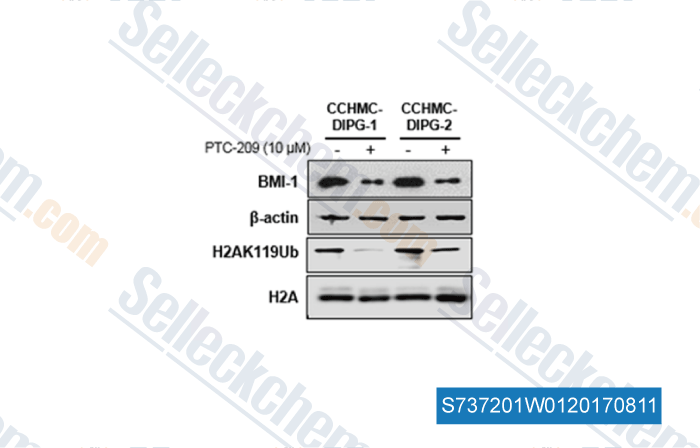|
Toll Free: (877) 796-6397 -- USA and Canada only -- |
Fax: +1-832-582-8590 Orders: +1-832-582-8158 |
Tech Support: +1-832-582-8158 Ext:3 Please provide your Order Number in the email. |
Technical Data
| Formula | C17H13Br2N5OS |
||||||||||
| Molecular Weight | 495.19 | CAS No. | 315704-66-6 | ||||||||
| Solubility (25°C)* | In vitro | DMSO | 99 mg/mL (199.92 mM) | ||||||||
| Water | Insoluble | ||||||||||
| Ethanol | Insoluble | ||||||||||
| In vivo (Add solvents to the product individually and in order) |
|
||||||||||
|
* <1 mg/ml means slightly soluble or insoluble. * Please note that Selleck tests the solubility of all compounds in-house, and the actual solubility may differ slightly from published values. This is normal and is due to slight batch-to-batch variations. * Room temperature shipping (Stability testing shows this product can be shipped without any cooling measures.) |
|||||||||||
Preparing Stock Solutions
Biological Activity
| Description | PTC-209 is a potent and selective BMI-1 inhibitor with IC50 of 0.5 μM in HEK293T cell line, and results in irreversible reduction of cancer-initiating cells (CICs). | ||
|---|---|---|---|
| Targets |
|
||
| In vitro | PTC-209 inhibits both the UTR-mediated reporter expression and endogenous BMI-1 expression in human colorectal HCT116 and human fibrosarcoma HT1080 tumor cells. PTC-209 decreases colorectal tumor cell growth in a BMI-1-dependent way. In addition, PTC-209 impairs colorectal cancer-initiating cells (CICs) through irreversible growth inhibition. [1] | ||
| In vivo | PTC-209 (60 mg/kg/day, s.c.) effectively inhibits BMI-1 production in tumor tissue, and halts growth of preestablished tumors in mice bearing primary human colon cancer xenograft, human colon cancer cell lines LIM1215 or HCT116 xenografts. PTC-209 also reduces the frequency of functional colorectal CICs in vivo. [1] | ||
| Features | BMI-1-selective inhibitor targeting self-renewal of cancer cells. |
Protocol (from reference)
| Kinase Assay:[1] |
|
|---|---|
| Cell Assay:[1] |
|
| Animal Study:[1] |
|
Customer Product Validation

-
Data from [Data independently produced by , , Oncotarget, 2017, doi: 10.18632/oncotarget.18002]
Selleck's PTC-209 has been cited by 28 publications
| Resveratrol Can Differentiate Human Melanoma Stem-like Cells from Spheroids Treated With All-trans Retinoic Acid [ Anticancer Res, 2024, 44(12):5283-5292] | PubMed: 39626925 |
| Alpha-tocopherol enhances spermatogonial stem cell proliferation and restores mouse spermatogenesis by up-regulating BMI1 [ Front Nutr, 2023, 10:1141964] | PubMed: 37139440 |
| PIC recruitment by synthetic reader-actuators to polycomb-silenced genes blocks triple-negative breast cancer invasion [ bioRxiv, 2023, 2023.01.23.525196] | PubMed: 36747762 |
| BMI1 promotes spermatogonial stem cell maintenance by epigenetically repressing Wnt10b/β-catenin signaling [ Int J Biol Sci, 2022, 18(7):2807-2820] | PubMed: 35541907 |
| BMI1 nuclear location is critical for RAD51-dependent response to replication stress and drives chemoresistance in breast cancer stem cells [ Cell Death Dis, 2022, 13(2):96] | PubMed: 35110528 |
| PRC1-independent binding and activity of RYBP on the KSHV genome during de novo infection [ PLoS Pathog, 2022, 18(8):e1010801] | PubMed: 36026503 |
| BMI1 promotes osteosarcoma proliferation and metastasis by repressing the transcription of SIK1 [ Cancer Cell Int, 2022, 22(1):136] | PubMed: 35346195 |
| BMI-1 promotes breast cancer proliferation and metastasis through different mechanisms in different subtypes [ Cancer Sci, 2022, 10.1111/cas.15623] | PubMed: 36285479 |
| SPP1 Derived from Macrophages Is Associated with a Worse Clinical Course and Chemo-Resistance in Lung Adenocarcinoma [ Cancers (Basel), 2022, 14(18)4374] | PubMed: 36139536 |
| The Systematic Analyses of RING Finger Gene Signature for Predicting the Prognosis of Patients with Hepatocellular Carcinoma [ J Oncol, 2022, 2022:2466006] | PubMed: 36199791 |
RETURN POLICY
Selleck Chemical’s Unconditional Return Policy ensures a smooth online shopping experience for our customers. If you are in any way unsatisfied with your purchase, you may return any item(s) within 7 days of receiving it. In the event of product quality issues, either protocol related or product related problems, you may return any item(s) within 365 days from the original purchase date. Please follow the instructions below when returning products.
SHIPPING AND STORAGE
Selleck products are transported at room temperature. If you receive the product at room temperature, please rest assured, the Selleck Quality Inspection Department has conducted experiments to verify that the normal temperature placement of one month will not affect the biological activity of powder products. After collecting, please store the product according to the requirements described in the datasheet. Most Selleck products are stable under the recommended conditions.
NOT FOR HUMAN, VETERINARY DIAGNOSTIC OR THERAPEUTIC USE.
